Related Research Articles

Mahavira, also known as Vardhamana, was the 24th Tirthankara of Jainism. He was the spiritual successor of the 23rd Tirthankara Parshvanatha. Mahavira was born in the early 6th century BCE to a royal Jain family of ancient India. His mother's name was Trishala and his father's name was Siddhartha. They were lay devotees of Parshvanatha. Mahavira abandoned all worldly possessions at the age of about 30 and left home in pursuit of spiritual awakening, becoming an ascetic. Mahavira practiced intense meditation and severe austerities for twelve and a half years, after which he attained Kevala Jnana (omniscience). He preached for 30 years and attained moksha (liberation) in the 6th century BCE, although the year varies by sect.

In Jainism, a Tirthankara is a saviour and supreme spiritual teacher of the dharma. The word tirthankara signifies the founder of a tirtha, a fordable passage across saṃsāra, the sea of interminable birth and death. According to Jains, tirthankaras are the supreme preachers of dharma, who have conquered saṃsāra on their own and made a path for others to follow. After understanding the true nature of the self or soul, the Tīrthaṅkara attains kevala jnana (omniscience). A Tirthankara provides a bridge for others to follow them from saṃsāra to moksha (liberation).

Acharya Virasena, also known as Veerasena, was a Digambara monk and belonged to the lineage of Acharya Kundakunda. He was an Indian mathematician and Jain philosopher and scholar. He was also known as a famous orator and an accomplished poet. His most reputed work is the Jain treatise Dhavala. The late Dr. Hiralal Jain places the completion of this treatise in 816 AD.
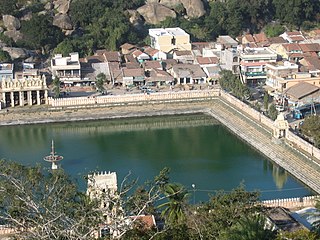
A Bhaṭṭāraka heads traditional Digambara Jain institutions. He is responsible for training scholars, maintenance of libraries, managing endowments, presiding over installation ceremonies and running Jain institutions.

Munisuvrata or Munisuvratanatha was the twentieth Tirthankara of the present half time cycle (avasarpini) in Jain cosmology. He became a siddha, a liberated soul which has destroyed all of his karma. Events of the Jaina version of Ramayana are placed at the time of Munisuvrata. Munisuvrata lived for over 30,000 years. His chief apostle (gaṇadhara) was sage Malli Svāmi.
Kashtha Sangha was a Digambar Jain monastic order once dominant in several regions of North and Western India. It is considered to be a branch of Mula Sangh itself. It is said to have originated from a town named Kashtha.

Balatkara Gana is an ancient Jain monastic order. It is a section of the Mula Sangh. It is often termed Balatkara Gana Sarasvati Gachchha. Until the beginning of the 20th century it was present in a number of places in India. However all its seats in North India became vacant in early 20th century. It survives only at Humbaj in Karnataka, which is its ancient seat.

Nathuram Premi was an Indian writer, publisher, poet, editor, and linguist in the field of Jainism as well as Hindi literature. A budding poet, he wrote under the nom de plume of "Premi". Although belonging to the Digambara sect of Jainism, he adopted a non-sectarian attitude and published and translated many Digambara as well as Śvetāmbara works. Working as a clerk in a firm in Mumbai he rose to establish his own publishing house and bookstore Hindi Granth Ratnākar Kāryālay which published works of many of the biggest names in Indian literature, including Munshi Premchand, Hajariprasad Dvivedi, Jainendrakumar, Yashpal, Swami Satyabhakta, Sharatchandra Chatterjee and Rabindranath Tagore. The bookshop and publishing house now called Hindi Granth Karyalay is now being managed by his grandson and great-grandson 100 years after its establishment.
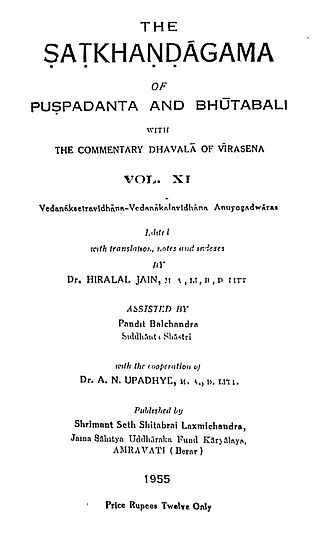
The Ṣaṭkhaṅḍāgama is the foremost and oldest Digambara Jain sacred text.

Sukhlal Sanghvi, also known as Pandit Sukhlalji, was a Jain scholar and philosopher. He belonged to the Sthanakvasi sect of Jainism. Pandit Sukhlal lost his eyesight at the age of sixteen on account of smallpox. However, he persisted and became profoundly versed in Jain logic and rose to become a professor at Banaras Hindu University. Paul Dundas calls him one of the most incisive modern interpreters of Jain philosophy. Dundas notes that Sanghavi represents what now seems to be a virtually lost scholarly and intellectual world. He was a mentor for famous Jain scholar Padmanabh Jaini. During his lifetime he won such awards as the Sahitya Akademi Award and won recognition from the Government of India by getting Padma Bhushan award. Sukhlalji was also known as Pragnachaksu because he was so vastly learned despite being visually disabled.

Hindi Granth Karyalay is an Indian publishing house and specialized book store dealing in books pertaining to Jainology and Indology in English, Hindi, Sanskrit, Prakrit and Apabhramsha. It was established in Mumbai, India in 1912 by its founder Nathuram Premi. It publishes and distributes serials, monographs, and scholarly publications on Indian religions, philosophy, history, culture, arts, architecture, archaeology, language, literature, linguistics, musicology, mysticism, yoga, tantra, occult, medicine, astronomy, astrology and other related subjects, and to date have published over 100 works of noted Indian and International authors and scholars.
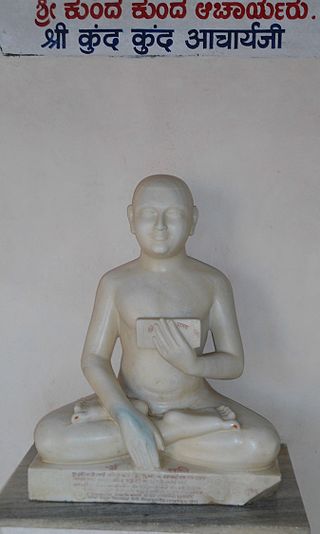
Digambara is one of the two major schools of Jainism, the other being Śvetāmbara (white-clad). The Sanskrit word Digambara means "sky-clad", referring to their traditional monastic practice of neither possessing nor wearing any clothes.

Jainism is an Indian religion which is traditionally believed to be propagated by twenty-four spiritual teachers known as tirthankara. Broadly, Jainism is divided into two major schools of thought, Digambara and Śvetāmbara. These are further divided into different sub-sects and traditions. While there are differences in practices, the core philosophy and main principles of each sect is the same.
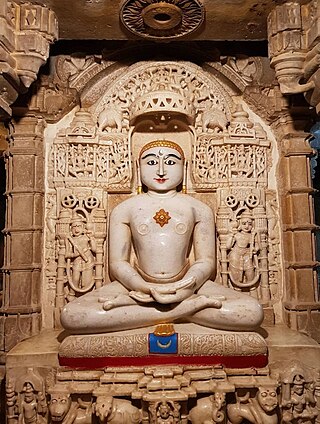
Chandraprabha or Chandranatha is the eighth Tirthankara of Tīrthaṅkara of Jainism in the present age. According to traditional accounts, he was born to King Mahasena and Queen Lakshmana Devi at Chandrapuri to the Ikshvaku dynasty. According to Jain texts, his birth-date was the twelfth day of the Posh Krishna month of the Indian calendar. He is said to have become a siddha, a liberated soul which has destroyed all of its karma.
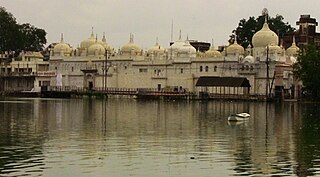
Bara Mandir is a historic Jain temple in Jabalpur, India, right on the edge of Hanumantal, once the main center of Jabalpur.

Samantabhadra was a Digambara acharya who lived about the later part of the second century CE. He was a proponent of the Jaina doctrine of Anekantavada. The Ratnakaranda śrāvakācāra is the most popular work of Samantabhadra. Samantabhadra lived after Umaswami but before Pujyapada.

Vividha Tirtha Kalpa is a widely cited Jain text composed by Jinaprabha Suri in the 14th century CE. It is a compilation of about 60 Kalpas (sections), most of them give the accounts of major Jain Tirthas.

Siddhantacharya Pandit Phoolchandra Shastri was a Jain scholar, writer, editor, freedom fighter, social reformer and an intellectual giant in the field of Jainism. He is best known for dedicating a major part of his life in translating to Hindi the foremost and the oldest Digambara Jain Canon Shatkhandāgama and Kasayapahuda and its commentaries Dhavala, Maha-Dhavala and Jai-Dhavala. He was also an active member of Indian National Congress during the Indian freedom struggle. He was also a strong advocate and proponent of abolishing many evils within the Jain community. Panditji was also the founding member of many institutes of learning and scholarship. As a recognition of his contribution to Jain philosophy, he was conferred a title of "Siddhantacharya" at Jain Siddhant Bhavan, Ara (Bihar) in 1962 by the Governor of Bihar Ananthasayanam Ayyangar.
Bhāvasena was a Jain philosopher of the Digambara school who lived in South India during the late 13th and early 14th century. His Viśvatattvaprkāśa is particularly important for its systematic questioning of the validity of the Vedic tradition. In his Collected papers on Jaina studies, P. S. Jaini gave an account of Bhāvasena and his Muktivicāra and Bhuktivicāra, with translations. Somewhat later, Eiichi Yamaguchi, in his report on the 14th world Sanskrit conference in Kyoto, 2009, refers to a paper delivered by Robert Zydenbos on Bhāvasena's Viśvatattvaprkāśa, but that work remains unpublished.
References
- ↑ Gender and Salvation: Jaina Debates on the Spiritual Liberation of Women, Padmanabh S. Jaini, University of California Press, 1991 p. 221
- ↑ Jaina Community: A Social Survey, Volume 2 of Popular library of Indian sociology and social thought, Vilas Adinath Sangave, Popular Prakashan, 1980p. 428
- ↑ Middle Indo-Aryan and Jaina Studies, Volumes 6-7 of World Sanskrit Conference 7, 1987, Leiden, Editors Colette Caillat, J. G. de Casparis, BRILL, 1991, p. 68
- ↑ Joharapurkar, Amit. Ek Sukhad Anubhav. Sanmati, Apr 2024, 74(8): 43-46